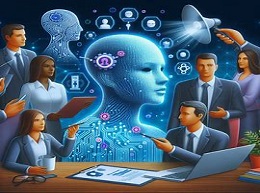Exploring AI in Human Resources: Recruitment, Diversity, and Inclusion

AI's Impact on Human Resources
Artificial Intelligence (AI) is transforming the landscape of human resources (HR), revolutionizing traditional practices and enhancing efficiency. This article explores the various ways AI is reshaping HR, with a focus on recruitment, diversity, and inclusion.
AI-Powered Recruitment: Efficiency and Accuracy
AI algorithms streamline the recruitment process by analyzing resumes, assessing candidate fit, and identifying top talent more efficiently than traditional methods. Platforms like LinkedIn Talent Solutions and HireVue utilize AI to screen resumes, conduct video interviews, and predict candidate success, saving time and resources for recruiters and candidates alike.
Mitigating Bias in Hiring Decisions
AI helps mitigate unconscious bias in hiring decisions by focusing on objective criteria and qualifications, rather than subjective impressions. By anonymizing candidate information and using algorithms to evaluate skills and competencies, AI reduces the influence of factors like gender, ethnicity, and age, promoting fair and equitable hiring practices.
Improving Candidate Experience with AI Chatbots
AI-powered chatbots enhance the candidate experience by providing instant support and information throughout the recruitment process. Chatbots engage with candidates, answer questions, schedule interviews, and provide feedback, delivering a personalized and responsive experience that improves engagement and satisfaction.
Enhancing Employee Onboarding and Training
AI streamlines employee onboarding and training processes by delivering personalized learning experiences tailored to individual needs and preferences. Adaptive learning platforms like Udemy and Coursera use AI algorithms to recommend courses, assess skill gaps, and track progress, enabling employees to acquire new skills and knowledge more effectively.
Promoting Diversity and Inclusion
AI plays a crucial role in promoting diversity and inclusion (D&I) in the workplace by identifying biases, analyzing diversity metrics, and implementing strategies to foster an inclusive culture. Tools like Textio analyze job descriptions for gender-neutral language, while platforms like Blendoor facilitate blind recruitment to minimize bias and promote diversity in hiring.
Addressing Ethical and Privacy Concerns
While AI offers significant benefits in HR, it also raises ethical and privacy concerns regarding data usage, algorithmic fairness, and transparency. HR professionals must ensure that AI systems comply with regulations, uphold ethical standards, and safeguard sensitive employee data to maintain trust and integrity in HR practices.
Embracing AI for a More Inclusive Future
AI holds immense potential to revolutionize HR practices, from recruitment to diversity and inclusion initiatives. By leveraging AI algorithms and data-driven insights, HR professionals can make more informed decisions, create fairer and more equitable workplaces, and foster a culture of diversity and inclusion. As organizations continue to embrace AI in HR, they have an opportunity to drive positive change and build a more inclusive future for employees of all backgrounds and identities.